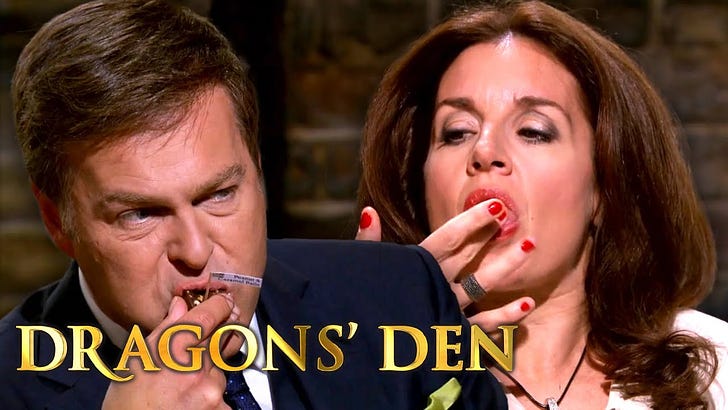Hi there,
While we looked at definitions and examples of the verb to bear last week, this week’s focus is on its impact on the American Constitution, gun ownership and legislation. Then, we’ll ease into BAD Brownies for a lighter (yet heavy and rich) finish and an interesting stroll around London, with a tweak!
Listening to this podcast as you read or take a walk is a great way to step up your English listening and pronunciation skills - and it may contain a bit more information than the written version.
Word Superpowers
A well regulated Militia, being necessary to the security of a free State, the right of the people to keep and bear Arms, shall not be infringed. (United States Constitution, Bill of Rights, 2nd Amendment,1791)
You have just read the thorniest* sentence in the American Constitution’s Bill of Rights, a series of amendments later added to guarantee the civil rights and liberties to the individual. The Second Amendment has inspired heated debate around three main issues since its ratification* 230 years ago:
the extent of government powers
the definition of Militia
the meaning of to bear arms
The wording is clear yet remains flexible to stand the test of time. More importantly, it reflects the US Constitution’s system of checks and balances where the executive, legislative and judicial branches establish the best framework between opposing “forces”: 1) the government vs the people, 2) rights/liberties vs legislation, and 3) freedom vs constraint or repression.
Let’s have a look at the range of meanings and interpretations of these words.
Militia vs Government
The definition of militia, and consequently who would have the right to bear arms, has remained open to interpretation since the very beginning over 200 years ago.
From a historical perspective, the Militia referred to the whole of the people: our right to self-defense/protection. The drafters of the American Bill of Rights were adamant in proving that, unlike the failed English Bill of Rights which was skewed towards the wealthy and a power-hungry ruling class, the Constitution was for every man, regardless of birth and wealth. Interpretation was, of course, completely biased compared to today’s world but more progressive than Old World law. When it came down to the right to bear arms, the English Crown imposed so many exceptions that it was, in fact, nearly impossible for the “common man” and dissidents to carry firearms and defend themselves, despite “having the right to do so”.
The concept of self-government is deeply embedded in the concept of militia.
The Self-Defense Mindset
Life was rife with violence as the North American continent became the stage to build a new nation. Violence was inextricably fused into everyday life and took on many shapes, from personal survival to systemic injustice, from the settler eking out a living to genocide and enslavement.
In this context, any individual was a militia-in-waiting, either to make a federal army redundant (thus minimizing the power of government) or to take on its role in times of crisis. The right to keep and bear arms became as much an unalienable right as an essential need.
This self-defense mindset is one of the strongest values that lies at the heart of American individualism .
Historical Context
Yet, even 230 years ago, there was a forward-looking interpretation of the term militia based on the belief that words and worlds would change and become intertwined into historical events and contexts. This perspective opens the way to modern laws on gun control.
I’ll add that similar “language wars” do take place. Linguists (and some English teachers) who follow prescriptivism are said to place too much value in “good, proper and correct English” to the detriment of the living language. Learners of English may find themselves lost in perfectionism and fear of making a mistake, unable to express themselves well, especially when communicating with fluent or native speakers of English.
My Gun, My Business?
Finally, what does to keep and bear arms imply? Is my gun stored under my pillow, in a gun locker or at the shooting range? Can I carry my fire arm in the open, or conceal it in my handbag? Is a permit needed, and if so, under what conditions? Are militias legitimate in 2021? Isn’t it safer to shoot an aggressor and save lives instead of doing nothing but calling the police? Are we all entitled to carry a fire arm?
To compound the problem, to bear arms carries too many potential definitions and nuances to fit into a one-size-fits-all solution, resulting in an unimaginable mess of freedoms and restrictions around gun control. And like Americans 230 years ago, today’s Americans hold many different opinions on the subject.
It seems to me that, ultimately, these differences reflect a blend of individual realities, expectations and perceptions. I came up with a little scale of gun ownership logic to help me understand this American question and the intense emotional debate generated, especially over the last 30 years:
I have a gun and no one can restrict my freedom - if I feel threatened, I defend myself (“stand my ground,” kill or be killed)
I have a gun for self-defense (the world is dangerous, never know what will happen) and/or for my livelihood (hunting in Alaska)
I accept or refuse regulation (gun permit, storage rules, acceptable use, open/concealed carry…)
I’m a responsible adult, my guns are none of your business (privacy)
I do not own a gun because the society I live in protects me (I am safe)
Redo this exercise and replace I with you.
Originalists and Textualists
If this weren’t enough, the interpretation of historical documents is a science unto itself. Originalists believe that meaning must be found in the original understanding of the law at the time it was adopted, while Textualists focus on present-day interpretation/meaning, detaching themselves from the initial intent of the drafters.
These are several Modes of Constitutional Interpretation and they have become essential and strategic tools wielded to obtain distinct and desired results in court.
Commentaries on the Second Amendment proliferated in the 20th century and leave behind complex arguments, opinions, and precedents - there is no simple, unified solution in sight. Yet a simple sentence preceded and followed by centuries of debate and case law sets United States gun control laws apart from most nations on earth.
How many???
In 2018, the Small Arms Survey, an independent research project located at the Graduate Institute of International and Development Studies in Geneva, Switzerland, reported that there are over one billion small arms distributed globally. 857 million, or about 85 percent of gun owners are civilians. In the United States alone, civilians own 393 million (about 46 percent) of the worldwide total of civilian held firearms.
Bad Brownies
Wait, don’t go, we’ve finished with the Constitution! BAD Brownie is a London brownie brand that apparently makes BAD, gloriously delicious, gooey and decadent brownies, where BAD=good, of course! This is THE website to keep in mind if you’re ever in London.
I urge you to brush up your culinary English, read mouthwatering product descriptions and a lovely About Us page. Do email us your best brownie recipe for next time.
But before then, have a look at the video where BAD Brownie founders successfully pitch investors to scale their business. They are tremendously likeable in this episode of the Dragon's Den, a British series about entrepreneurs wooing investors with or without success. The video link is below but I forgot to mention it in the podcast!
Augmented Reality Visits in…London
Until the 9th of February 2021, download an app that “aims to transform the city into an immersive augmented reality (AR) art gallery”. The concept shares some similarities with Pokémon GO as you’ll be on your phone and seeing one of 36 digital sculptures hovering on the screen.
I jumped on the opportunity and soon realized that… unless you are in London, you won’t see London. I tested it on my cats in the living room and it was highly entertaining. My next step is to try see Geneva as an art gallery.
I am assuming that despite the numerous permissions requested on installation, the app is safe as it was featured in London’s biggest public festival of AR art. If you are brave enough to download and install, let us know how it has transformed your city or your home into an AR art gallery!
Book Club - New Meeting Time
With interested parties from Asia, our book club discussion sessions will take place around noon, UTC + 1 and we have delayed our January launch to accommodate Asian participants!
Sign-up and share
No spam, no ads, just a weekly email, podcast link, bonuses here and there, all delivered to your email. Thanks 😍
Links
The Second Amendment, Commentary: en.wikipedia.org/wiki/Second_Amendment_to_the_United_States_Constitution#Scholarly_commentary
*a thorn - Sharp spikes on the stems of roses, blackberries or other bushes; thorny (thornier, thorniest) - difficult and complex (like cutting the stem of a rose in a dense bush without drawing blood, or hurting yourself)
*to ratify (ratified); ratification - To give formal consent to; make officially valid, sign off on; to approve (https://en.wiktionary.org/wiki/ratify)
*Modes of Constitutional Interpretation include textualism, original meaning, judicial precedent, pragmatism, moral reasoning, national identity, structuralism, and historical practices.
More on Modes of Constitutional Interpretation, summary page 2: https://fas.org/sgp/crs/misc/R45129.pdf
Bad Brownie: www.badbrownie.co.uk/pages/about-us
Bad Brownie pitching their product to investors:
Book Club: https://learn.ohyes.ch/courses/step-up-book-club-january-2021/preview
Unreal City at Home: www.acuteart.com/artist/unreal-city










